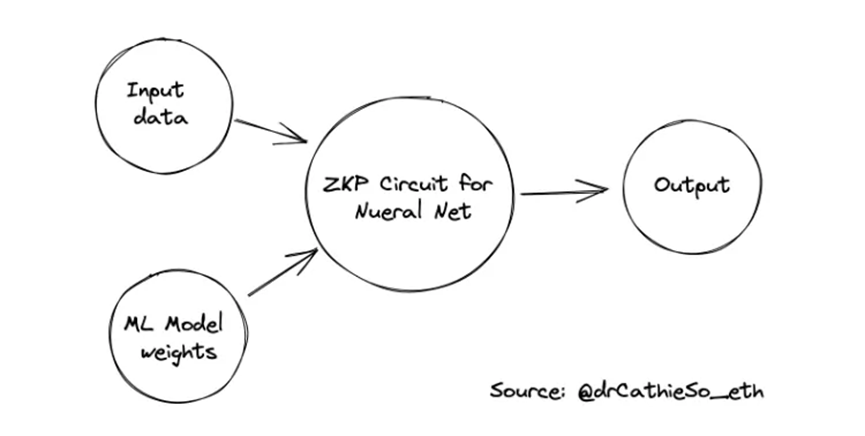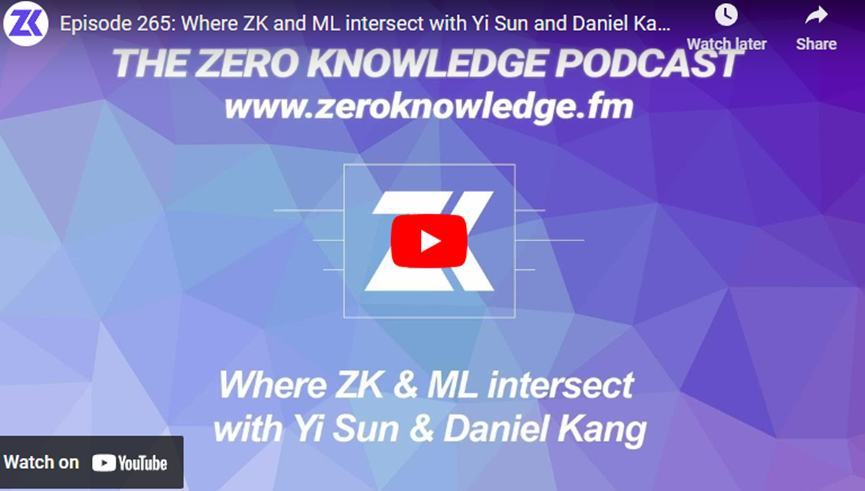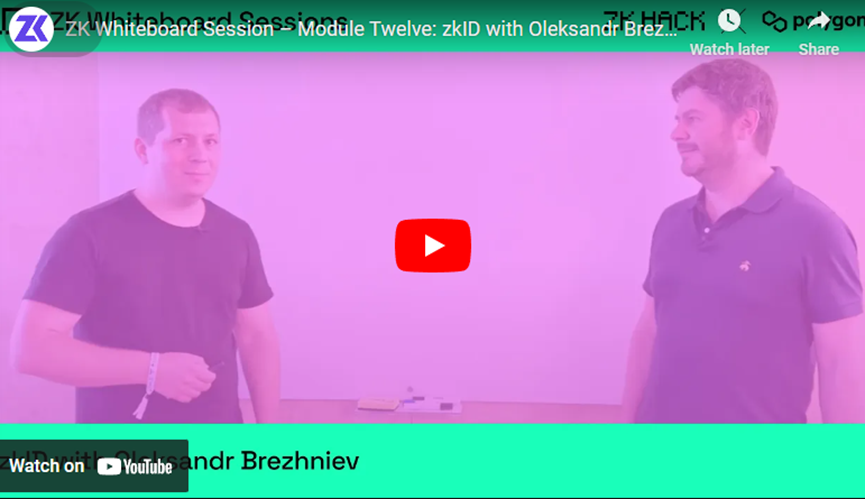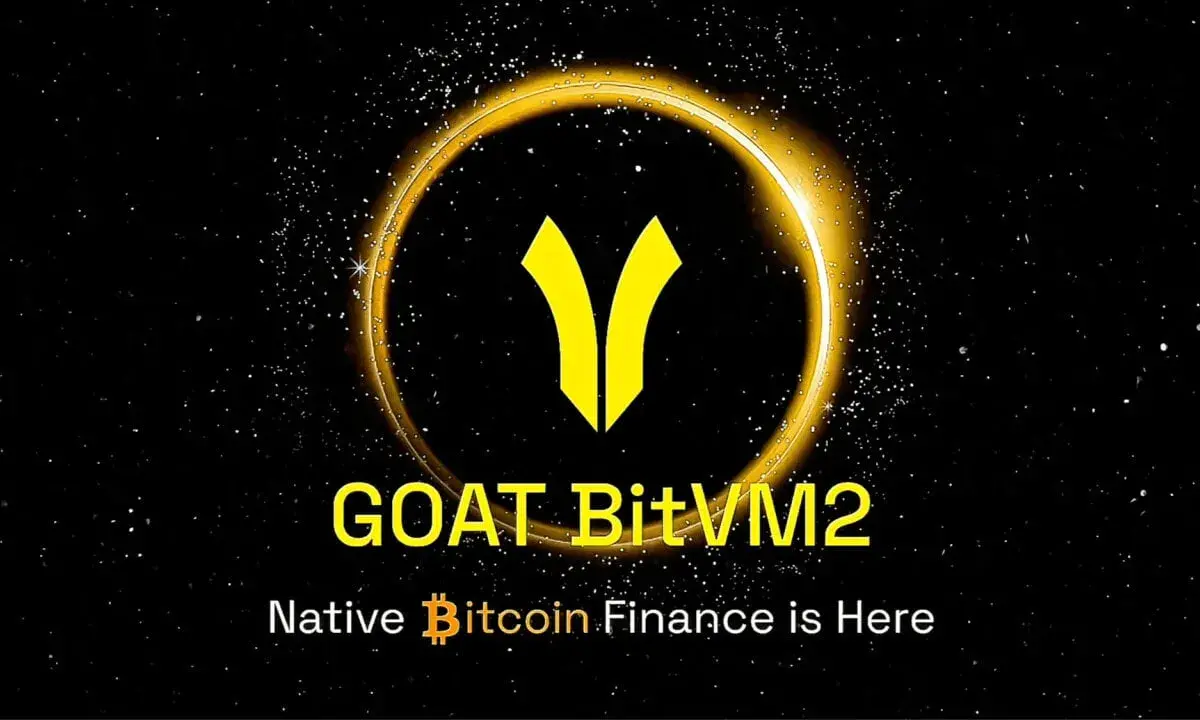Emerging ZK new use cases: ZKML, ZK games, ZKID
Original Title: 《Emerging ZK Use Cases》
Author: zkvalidator
Compiled by: Kate, Marsbit
In the past few months, we have witnessed a lot of hype around zero-knowledge use cases, including zkevm, zkBridges, and more. However, in such a fast-paced environment, new use cases are emerging where zero-knowledge proofs (ZKP) play a crucial role. This article aims to explore the areas where ZKP is gaining more attention in people's minds.
ZKML Zero-Knowledge Machine Learning

This chart shows how zkML works.
ZKML (Zero-Knowledge Machine Learning) is an emerging technology with enormous potential across various applications that has yet to be fully developed. From computational integrity and privacy protection to transparency in machine learning as a service and decentralized inference or training, ZKML opens new doors for innovation. Here are some potential use cases for ZKML:
Verifiability of ZKML: ZKML utilizes validity proofs such as SNARKs and STARKs to ensure the accurate execution of computations, particularly in machine learning. By using these proofs, the inference of machine learning models can be verified, confirming the source of outputs based on given inputs. This feature allows for the deployment of machine learning models off-chain while conveniently verifying ZK proofs on-chain.

Privacy Protection in ZKML: Privacy is a key issue in machine learning, and ZKML provides a solution. It can prove the accuracy of models on test data without revealing the weights used, thereby ensuring data privacy. Additionally, ZKML facilitates privacy-preserving inference, allowing sensitive medical diagnoses, such as cancer detection results, to be shared with patients without leaking their data to third parties.
Enhancing Transparency in Machine Learning as a Service (ML-as-a-Service): ZKML plays a crucial role in improving the transparency of machine learning as a service. By providing validity proofs associated with machine learning model APIs, users can verify the authenticity of the models they are using. This addresses issues related to traditional APIs (often viewed as black boxes) and increases trust in the models provided.
Decentralized Inference and Training: ZKML can execute machine learning tasks in a decentralized manner. The model can be compressed using zero-knowledge proofs, allowing public participation and data submission during inference or training. This opens new avenues for collaborative and distributed machine learning.
ZKML Proofs: Proofs are an important aspect of ZKML, allowing verifiable proofs to be aggregated from trusted external parties. By using zero-knowledge proofs to verify digital signatures from reliable sources, ZKML ensures the authenticity and provenance of the proven information. This allows for the verification and use of trusted references across various applications.
ZK Applications in Gaming

Zero-Knowledge Proofs (ZKP) offer numerous advantages for game architecture and gaming experiences. By integrating ZKP, game developers can benefit from reduced costs, enhanced privacy protection, effective anti-cheat measures, and improved scalability.
In terms of game architecture, ZKP significantly impacts online multiplayer games by minimizing the sensitive data stored on centralized servers, thus reducing the costs associated with maintaining client-server architectures. Furthermore, ZKP enhances the privacy and security of peer-to-peer (P2P) gaming systems, eliminating the need for expensive servers while ensuring the authenticity of in-game events and preventing cheating.
ZKP also addresses the scalability challenges in gaming by reducing server overhead in client-server architectures and enabling verifiable game operation proofs in P2P multiplayer games. This expands the number of concurrent players supported, leading to a more enjoyable gaming experience and attracting a broader player base.
In terms of gameplay, ZKP provides solutions for various game types. In first-person shooter (FPS) games, ZKP can verify a player's skill level without revealing sensitive information, thereby improving match accuracy. In massively multiplayer online role-playing games (MMORPGs), ZKP can ensure secure ownership and exchange of virtual assets, creating a unified economy across different games. ZKP is also applicable in gambling and casino games, providing verifiable random outcomes while protecting player privacy. Additionally, ZKP can ensure players' progress and high scores in puzzle and strategy games while keeping sensitive information confidential.
Adopting ZKP in the gaming industry can enhance the gaming experience, increase player retention, and generate higher revenues. As the use of ZKP expands, dedicated hardware may become crucial to meet the growing computational demands.
ZK ID - Decentralized ID

In today's online environment, establishing digital trust and secure identity verification is essential. The emergence of zero-knowledge proofs (ZKP) has revolutionized this field by providing greater privacy and security. Here, we will explore the properties and advantages of zero-knowledge proofs and their potential to redefine digital identity verification.
• Enhanced Privacy Protection: Zero-knowledge proofs excel at protecting sensitive information. Users can verify their identity or credentials without disclosing specific details such as personal identification numbers or addresses. ZKP establishes a secure framework that allows for trustless interactions while maintaining confidentiality.
• Secure and Verifiable Interactions: Zero-knowledge proofs enable users to engage in smart contracts and verify information on the blockchain while concealing their private data. Off-chain credentials like passports or educational degrees can generate zero-knowledge proofs. These proofs can then be used for trustless verification on the blockchain, ensuring data integrity while preserving privacy.
Recently, Polygon launched Polygon ID, a zero-knowledge decentralized identity solution. Polygon ID harnesses the power of zero-knowledge proofs to allow users to verify their identity without disclosing sensitive information. It provides a comprehensive toolkit, including a verifier SDK, issuer nodes, wallet SDK, and wallet applications, enabling developers to seamlessly integrate decentralized identity solutions into their applications.
Conclusion
In summary, the diversity of areas where ZK has a positive impact indicates the potential of this technology for mass adoption in the blockchain industry. In fact, most of these applications—zkML, ZK gaming, ZK ID—are still in their infancy, with some largely remaining in the theoretical realm. Nevertheless, we see that more activity and products from the zkML, ZK gaming, or ZK ID fields are just a matter of time. As these areas mature, we look forward to a vibrant ecosystem of ZK-based applications that will redefine our concepts of privacy, security, and verifiability.


























